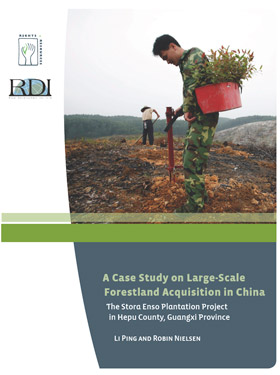Note: Stora Enso issued a response to this report here.
Finnish paper company, Stora Enso, may lose its green and socially responsible reputation over a new report by Rights and Resources International (RRI) and the Rural Development Institute (RDI). The report finds that the company broke Chinese laws and even worked with middlemen who physically threatened local farmers, all in an effort to lease 120 thousand hectares for a vast eucalyptus plantation in southern China. Just last year, a lawyer working to defend farmers landed in a hospital after being beaten for his involvement.
“Unfortunately, we now know that the people who inhabit and depend on forestlands—whether in China or other vulnerable nations—cannot count solely on a company’s reputation for corporate social responsibility,” said Andy White, coordinator of RRI, in a statement.
On its website Stora Enso claims it makes paper only from ‘sustainable sources’ and that it is ‘committed to the United Nations Universal Declaration of Human Rights’. The company even includes a video of Stora Enso CEO having a frank sit-down conversation with a Greenpeace activist about deforestation.
 A Case Study on Large-Scale Forestland Acquisition in China: The Stora Enso Plantation Project in Hepu County, Guangxi Province |
“[Stora Enso] strives to uphold better social and environmental standards than most [other paper companies]. Yet their approach in this case is very disappointing, particularly as these problems were identified in early 2006,” says Marcus Colchester, Director of the Forest Peoples Program.
While local authorities have pushed Stora Enso’s plans for a vast monoculture plantation, many local farmers, dependent on the land, have come out against it. Based on interviews with Chinese farmers, community officials, as well as Stora Enso representative, the report found that most of the farmers said they had not been consulted about the leasing of collectively owned land to Stora Enso, even though according to a 2002 Chinese law farmers must sign off on such transfers.
In addition, “many of those who agreed to a transfer of land felt pressured to do so by local political leaders—in some cases under duress and in response to threats of physical violence,” Li Ping, co-author of the report said.
The report also found that most of the land transfers (90 percent) were dealt with by hired middlemen or a local government company created solely to acquire this land for the Finnish company. However, Chinese law states that rural land transfers must be conducted directly between the transfer and purchaser.
“To acquire land legally and in a socially-responsibly fashion, Stora Enso should have negotiated with farmers and collectives, and paid a market rent determined under the ‘willingbuyer-willing-seller’ approach,” Ping explains.
RRI and RDI say that they warned Stora Enso of these issues back in 2006, but according to them the company did little. After news of the report came out, Stora Enso said last month that it had hired lawyers to investigate the issue.
“This is a wakeup call,” said Ujjwal Pradhan, Regional Coordinator of the Southeast Asia Program of the World Agroforestry Centre (ICRAF). “Companies and their investors need to proactively investigate land rights and ongoing land-related conflicts. They cannot assume that local rights and interests are being protected, or that the laws are being followed, just because local governments are involved.”
The report stresses that since demand is growing for agricultural and forest land, such conflicts between big companies and locals—often dependent on the land—are becoming more common.
“China is not alone in confronting inappropriate land grabs,” concluded Andy White, RRI coordinator. “This is a global trend that was documented recently in a World Bank report. But the solution the World Bank recommends—that we rely on corporate social responsibility to ensure good behavior—is grossly inadequate.”
Note: Stora Enso issued a response to this report here.
Related articles
Loss of old growth forest continues

(10/06/2010) A new global assessment of forest stocks by the U.N. Food and Agriculture Organization (FAO) shows continuing loss of primary forests since 2005 despite gains in the extent of protected areas. FAO’s Global Forest Resources Assessment 2010 reveals some 13 million hectares of forest were cleared between 2000 and 2010, down from around 16 million hectares per year during the 1990s. Loss of primary forest—mostly a consequence of logging—averaged 4.2 million hectares per year, down from 4.7 million hectares per year in the 1990s.
The Nestlé example: how responsible companies could end deforestation

(10/06/2010) The NGO, The Forest Trust (TFT), made international headlines this year after food giant Nestlé chose them to monitor their sustainability efforts. Nestlé’s move followed a Greenpeace campaign that blew-up into a blistering free-for-all on social media sites. For months Nestle was dogged online not just for sourcing palm oil connected to deforestation in Southeast Asia—the focus of Greenpeace’s campaign—but for a litany of perceived social and environmental abuses and Nestlé’s reactions, which veered from draconian to clumsy to stonily silent. The announcement on May 17th that Nestlé was bending to demands to rid its products of deforestation quickly quelled the storm. Behind the scenes, Nestlé and TFT had been meeting for a number of weeks before the partnership was made official. But can TFT ensure consumers that Nestlé is truly moving forward on cutting deforestation from all of its products?
What happened to China?: the nation’s environmental woes and its future

(04/01/2010) China has long been an example of what not to do to achieve environmentally sustainability. Ranking 133rd out of 146 countries in 2005 for environmental performance, China faces major environmental problems including severe air and water pollution, deforestation, water-issues, desertification, extinction, and overpopulation. A new article in Science discusses the complex issues that have led to China’s environmental woes, and where the nation can go to from here.














